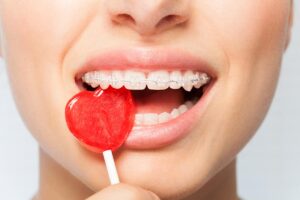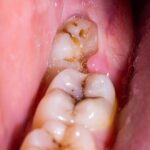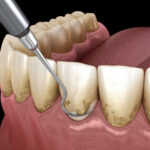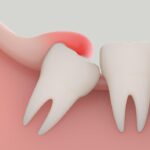Why Does My Tooth Hurt When I Bite Down

Tooth pain when biting down can be caused by various issues, including tooth decay, a cracked or fractured tooth, a loose filling, gum disease, or an abscess. These conditions can affect the tooth’s integrity or the surrounding tissues, leading to pain upon applying pressure.
Table of Contents
Possible Reasons Why Your Tooth Hurts When Biting Down or Chewing
When you experience pain in your tooth while biting down or chewing, it could be due to various reasons. Here are some possible causes for this kind of dental discomfort:
Tooth Decay or Cavity
Tooth decay occurs when the enamel (the hard, outer layer of your tooth) is eroded by acidic substances produced by bacteria in plaque.
As the decay progresses deeper into the tooth, it can reach the dentin, a softer layer beneath the enamel that’s more sensitive to temperature and pressure.
This can cause sharp pain or discomfort when biting down or when the tooth comes into contact with hot or cold foods.
Cracked or Fractured Tooth
Teeth can crack from an injury, biting on something hard, or even from long-term wear. Cracks can be tiny and sometimes invisible to the naked eye or an X-ray, but they can cause significant pain.
When you bite, pressure causes the crack to open slightly, and when released, the pressure on the tooth causes sharp pain. Treatment depends on the size and location of the crack but may include a crown or root canal.
Damaged Filling
Fillings can wear out over years of use, or they can become damaged or fall out. This leaves the affected tooth susceptible to temperature changes, pressure, and decay, leading to pain when biting or chewing.
A dentist can easily replace or repair damaged fillings, alleviating the pain.
Dental Abscess
A dental abscess is a pocket of pus caused by a bacterial infection at the root of the tooth or between the tooth and the gum.
This condition can cause severe, persistent, throbbing pain that can radiate to the jawbone, neck, or ear. You have to treat an abscess promptly with antibiotics and possibly a root canal or extraction to prevent the spread of infection.
Gum Disease
Gum disease (gingivitis) that progresses to a more severe condition (periodontitis) can cause the gums to recede and form pockets around the teeth. These pockets can become infected, leading to pain when biting and other symptoms like bleeding, swelling, and bad breath. Treatment may include deep cleaning, antibiotics, and in severe cases, surgery.
Impacted Tooth
An impacted tooth has not erupted properly and is stuck against another tooth, bone, or soft tissue, often causing pain and discomfort.
Wisdom teeth are commonly impacted. Treatment typically involves surgical removal of the impacted tooth.
Temporomandibular Joint Disorders (TMJ/TMD)
TMJ disorders affect the joint that connects your jaw to the skull. Symptoms include pain around the ear, jaw stiffness, and a clicking sound when opening the mouth. Pain can worsen when chewing.
Treatment ranges from simple self-care practices and medications to more advanced options like physical therapy or dental appliances.
Sinus Pressure
The roots of the upper teeth are close to the sinus cavities. When these cavities become inflamed due to sinusitis, the pressure can cause dental pain that mimics toothache. Treating the underlying sinus condition usually resolves the dental pain.
Bruxism (Teeth Grinding or Clenching)
Frequent teeth grinding or clenching can wear down tooth enamel and lead to increased tooth sensitivity or pain when biting. It can also strain the muscles and joints in the jaw, contributing to TMJ disorders. Treatment often includes wearing a mouthguard at night to protect the teeth.
Receding Gums
Gum recession exposes the roots of the teeth, which lack the protective enamel layer. This can lead to sensitivity and pain, especially when pressure is applied during biting.
Treatment focuses on gum health and may include special toothpastes, mouthwashes, or surgical grafting in severe cases.
Periodontal Disease
Advanced gum disease affects not only the gums but also the bones and ligaments supporting the teeth. This can cause teeth to become loose and sensitive, making chewing painful.
Treatment includes deep cleaning, antibiotics, and potentially surgery to repair the damaged structures.
Misaligned Teeth or Bite Issues
When teeth are not properly aligned, or there’s an issue with the bite (how the teeth come together), it can put extra stress on certain teeth. This uneven pressure can lead to pain when biting.
Orthodontic treatment, such as braces or Invisalign aligners, can correct misalignment and alleviate the discomfort.
How tooth pain leads to more serious issues
Tooth pain is not just an uncomfortable inconvenience; it can also be a harbinger of more serious dental and health issues if left untreated.
The progression from initial tooth pain to more significant health concerns underscores the importance of addressing dental discomfort early.
Here’s how ignoring tooth pain can lead to more severe issues:
Spread of Infection
- Root to Other Parts of the Body: A dental abscess, which can cause severe tooth pain, is a localized infection at the tooth’s root or between the gum and a tooth. If not treated, the infection can spread to surrounding tissues, leading to cellulitis, or even to distant parts of the body, causing serious conditions like sepsis, which is life-threatening. Read more: How Long Until A Tooth Infection Kills You?
- Bone Loss: Infections leading to periodontal disease can cause the deterioration of the jawbone. The bacteria causing the infection can erode the bone, weakening its structure and leading to tooth loss and significant facial deformity.
Tooth Loss
Persistent tooth pain often indicates severe decay or gum disease, which can weaken the structures supporting the tooth. Without intervention, the affected tooth may become so damaged that it must be removed.
Losing a tooth can lead to other problems, such as shifting of the remaining teeth, difficulties in chewing, and loss of jawbone density.
Chewing Difficulties and Nutritional Deficiencies
Painful teeth can make it difficult to chew certain foods, potentially leading to avoidance of healthy, fibrous foods like fruits and vegetables.
Over time, this can cause nutritional deficiencies that affect overall health, exacerbating conditions like heart disease, diabetes, and obesity.
Impact on Cardiovascular Health
There is growing evidence to suggest that chronic oral infections, particularly those causing gum disease, can contribute to cardiovascular diseases.
Bacteria from the mouth can enter the bloodstream, leading to inflammation and atherosclerosis (hardening of the arteries), increasing the risk of heart attack and stroke.
Complications with Diabetes
For individuals with diabetes, any form of infection, including oral infections causing tooth pain, can make blood sugar more difficult to control.
Conversely, well-managed blood sugar levels can help combat infections, highlighting the interplay between diabetes and oral health.
Decreased Quality of Life
Beyond the physical repercussions, persistent tooth pain can severely impact one’s quality of life. It can lead to poor sleep, difficulty concentrating, mood changes, and overall reduced well-being.
Chronic pain can also contribute to mental health issues, including depression and anxiety.
Costly Dental Procedures
Ignoring tooth pain can lead to the need for more complex and expensive dental procedures down the line. What might have been a simple filling could turn into a need for a root canal, crown, or even tooth extraction and replacement with an implant or bridge.
Effects on Social and Professional Life
Severe dental issues can affect one’s confidence and willingness to engage in social and professional activities, particularly if the appearance of the teeth is affected or if there is noticeable bad breath due to decay or infection.
What to do when you experience pain while chewing
When experiencing pain while chewing, first avoid hard or extreme-temperature foods to prevent aggravating the issue.
Maintain oral hygiene with gentle brushing and flossing.
Use over-the-counter pain relievers if necessary.
Importantly, schedule a dental appointment as soon as possible to diagnose and treat the underlying cause of the pain, whether it’s a cavity, cracked tooth, gum disease, or another issue.
Finding Relief at Home
Finding relief from tooth pain at home can help manage symptoms until you’re able to see a dentist.
Here are some effective home remedies:
- Saltwater rinse: Mix a half teaspoon of salt into a glass of warm water and use it as a mouth rinse. This can help reduce inflammation and cleanse the area.
- Cold compress: Apply a cold compress or an ice pack wrapped in a towel to the outside of your cheek to reduce swelling and numb the pain.
- Over-the-counter pain relievers: NSAIDs (nonsteroidal anti-inflammatory drugs), like ibuprofen or acetaminophen, can help manage the pain. Always follow the recommended dosage and consult a healthcare professional if unsure.
- Clove oil: Clove oil contains eugenol, a natural antiseptic that can numb pain and reduce inflammation. Apply a small amount to a cotton ball and dab it on the affected area.
- Hydrogen peroxide rinse: Rinsing with a solution made from equal parts hydrogen peroxide and water can help kill bacteria and relieve discomfort. Do not swallow the solution!
- Peppermint tea bags: Apply a cooled peppermint tea bag to the painful area. The cooling effect of peppermint can soothe tooth pain.
- Garlic paste: Garlic has natural antibacterial properties and can provide relief. Crush a garlic clove into a paste and apply it to the affected area.
- Avoid hard, acidic, or sugary foods: These can aggravate your tooth pain. Opt for soft foods and drink plenty of water.
- Keep your head elevated: When lying down, use extra pillows to keep your head elevated. This can prevent blood from pooling in the head and exacerbating pain.
- Oral hygiene: Continue to gently brush and floss your teeth to remove any food particles that could be contributing to the pain.
FAQ on Why Does My Tooth Hurt When I Bite Down
Why does only one tooth hurt when I bite down?
If only one tooth hurts when you bite down, it may be due to a cavity, a cracked or fractured tooth, a damaged filling, or gum recession around that particular tooth. These issues can make the tooth sensitive to pressure from biting. It’s also possible that there’s an infection at the tooth’s root. A visit to the dentist is necessary to diagnose and treat the underlying cause of the pain, preventing further damage or infection.
Does a cavity hurt when you bite down?
Yes, a cavity can hurt when you bite down. When tooth decay breaches the enamel and reaches the dentin or the inner pulp, it exposes the sensitive nerves of the tooth to pressure and temperature changes, causing pain during biting or chewing. The extent of pain can vary depending on the depth and location of the cavity. Early dental intervention can prevent the decay from worsening and alleviate the pain.
Why does my tooth hurt when I press down on it?
If your tooth hurts when you press down on it, it could be due to several reasons: inflammation of the tooth’s pulp (pulpitis), which is often caused by decay reaching the inner layers of the tooth; a dental abscess, where infection builds up at the root or in the gums; a cracked tooth, which might not be visible but can cause sharp pain on pressure; gum disease, leading to sensitivity around the tooth; or even a recent dental procedure that temporarily heightened the tooth’s sensitivity.
Why do my molar teeth hurt when I chew?
If your molar teeth hurt when you chew, it could be due to several issues: cavities or tooth decay in the molars, which are more prone to decay due to their role in grinding food and their harder-to-clean locations; cracked or fractured molars from chewing hard foods or grinding teeth; gum disease affecting the area around the molars; or an abscess or infection in the roots of the molar teeth. Molars can also experience sensitivity from receding gums exposing the roots.
Fact Checked
Our dedicated team rigorously evaluates every article and guide to ensure the information is factual, up-to-date, and free of bias.
Updated Regularly
We update our articles and reviews regularly to ensure you have access to the latest data in the dental industry.
The content on Dental3DU’s blog is intended for educational purposes only. This information should not be relied upon as professional medical counsel. Be sure to always consult with your dentist about the dangers and benefits of any medication, treatment or procedure.







